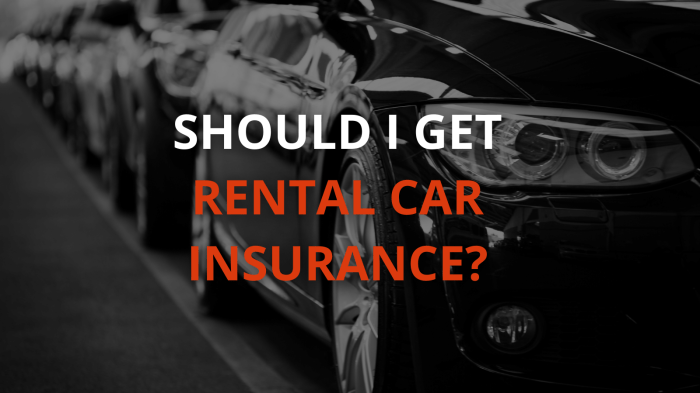
Car insurance for rental cars in Canada is a crucial aspect of responsible driving, ensuring peace of mind during your travels. Whether you’re exploring the scenic landscapes of the Rockies or navigating the bustling streets of Toronto, having the right coverage can protect you from unexpected financial burdens in case of accidents, theft, or damage to the vehicle. This comprehensive guide will delve into the intricacies of car insurance for rental cars in Canada, providing you with the essential knowledge to make informed decisions.
From understanding the different types of coverage available to comparing the options offered by rental companies and personal insurance providers, this guide will equip you with the tools to choose the most suitable insurance plan for your needs. We’ll also discuss key considerations such as deductibles, coverage limits, and potential risks, helping you navigate the complexities of rental car insurance with confidence.
Understanding Car Insurance for Rental Cars in Canada
Renting a car in Canada can be a convenient way to explore the country, but it’s crucial to understand the different types of car insurance coverage available to ensure you’re protected in case of an accident or other incident. This guide will explain the various insurance options, mandatory requirements, and how rental car insurance compares to your personal car insurance policy.
Types of Car Insurance Coverage for Rental Cars
Rental car companies typically offer various insurance options, including:
- Liability Insurance: This coverage protects you against financial losses resulting from damage or injury to others in an accident caused by you. It’s usually mandatory in Canada and covers damages to other vehicles, property, and personal injury.
- Collision Damage Waiver (CDW): This optional coverage protects you from financial responsibility for damage to the rental car. If you choose CDW, you won’t be liable for repairs or replacement costs, even if the accident is your fault. However, there may be a deductible you need to pay.
- Loss Damage Waiver (LDW): Similar to CDW, LDW covers you against theft or total loss of the rental car. This option is often combined with CDW in a single package.
- Personal Accident Insurance (PAI): This optional coverage provides financial protection for you and your passengers in case of an accident. It can cover medical expenses, lost wages, and even death benefits.
- Supplemental Liability Insurance (SLI): This optional coverage extends your liability insurance coverage beyond the minimum requirements. It’s particularly helpful if you have assets you want to protect in case of a significant accident.
Mandatory Insurance Requirements for Rental Cars
Canadian law requires all drivers to have liability insurance. The minimum coverage required varies by province, but it typically includes:
- Third-Party Liability: This covers damages to other vehicles, property, and personal injury caused by the insured driver.
- Accident Benefits: These benefits cover medical expenses, lost wages, and rehabilitation costs for the insured driver and passengers.
Comparison of Rental Car Insurance and Personal Car Insurance
It’s essential to compare the coverage offered by rental car companies with your personal car insurance policy to determine the best protection for your situation.
- Coverage: Your personal car insurance policy may already provide some coverage for rental cars. Check your policy to see if it includes liability, collision, and comprehensive coverage for vehicles you rent. If not, you’ll need to purchase additional coverage from the rental car company.
- Deductibles: Both your personal car insurance and rental car insurance may have deductibles. The deductible is the amount you’ll pay out of pocket before your insurance kicks in. Compare the deductibles for both options to determine the most cost-effective choice.
- Cost: The cost of rental car insurance can vary significantly depending on the type of coverage you choose, the rental car company, and the length of your rental. Compare the costs of renting with and without additional insurance to make an informed decision.
Key Considerations for Choosing Car Insurance

Choosing the right car insurance for your rental car in Canada is essential to ensure you’re adequately protected in case of an accident or other unforeseen events. Several factors influence the cost of your insurance, and understanding these factors will help you make an informed decision.
Factors Affecting Rental Car Insurance Costs
- Age: Younger drivers, particularly those under 25, often face higher insurance premiums due to their higher risk profiles.
- Driving History: Your driving record, including any accidents or traffic violations, can significantly impact the cost of your rental car insurance. A clean driving history usually translates to lower premiums.
- Rental Duration: Longer rental periods generally result in higher insurance costs. Insurance companies often adjust their premiums based on the length of your rental.
- Vehicle Type: The type of rental car you choose also influences the cost of insurance. Luxury vehicles, SUVs, or high-performance cars typically have higher insurance premiums compared to standard economy cars.
- Location: Rental car insurance costs can vary depending on the location where you’re renting the car. Areas with higher accident rates or theft rates may have higher premiums.
- Coverage Options: The specific coverage options you select, such as collision damage waiver (CDW) or liability insurance, will also affect the cost of your insurance.
Understanding Deductibles and Coverage Limits
It’s crucial to understand the deductibles and coverage limits associated with rental car insurance.
* Deductible: This is the amount you’re responsible for paying out-of-pocket in case of an accident or damage to the rental car. Lower deductibles typically mean higher insurance premiums.
* Coverage Limits: These are the maximum amounts your insurance policy will cover for specific types of damages or losses. It’s essential to choose coverage limits that adequately protect you financially in case of a significant accident or claim.
Covered Risks and Scenarios
Rental car insurance provides coverage for a range of potential risks and scenarios, including:
* Collision Damage: Covers damages to the rental car caused by an accident, regardless of fault.
* Theft: Protects you against the loss of the rental car due to theft.
* Liability Coverage: Provides financial protection if you’re responsible for causing damage to another vehicle or property.
* Personal Injury Protection (PIP): Covers medical expenses and lost wages for you and your passengers in case of an accident.
* Uninsured/Underinsured Motorist Coverage: Provides protection if you’re involved in an accident with a driver who doesn’t have adequate insurance.
* Roadside Assistance: Offers assistance with towing, flat tire changes, and other roadside emergencies.
* Emergency Medical Expenses: Covers medical expenses incurred outside of your home province or territory.
Purchasing Car Insurance for Rental Cars
When renting a car in Canada, you have several options for obtaining insurance coverage. You can choose to purchase insurance through the rental company, your personal insurance provider, or a third-party insurance broker. Each option comes with its own advantages and disadvantages, and understanding these differences can help you make an informed decision about the best way to protect yourself financially.
Purchasing Car Insurance from the Rental Company
Rental companies typically offer various insurance packages, including collision damage waiver (CDW), liability insurance, and personal accident insurance. These packages are designed to cover damages to the rental car and potential liability claims arising from accidents.
- Advantages:
- Convenience: The insurance is purchased directly from the rental company, simplifying the process.
- Comprehensive Coverage: Rental company insurance often provides comprehensive coverage, including collision damage, liability, and personal accident protection.
- Peace of Mind: Knowing you have insurance in place can provide peace of mind while driving a rental car.
- Disadvantages:
- Cost: Rental company insurance can be expensive, especially when compared to other options.
- Potential for Hidden Fees: Some rental companies may add hidden fees or charges to their insurance packages.
- Limited Coverage: While rental company insurance provides basic coverage, it may not be as extensive as your personal insurance policy.
Purchasing Car Insurance from Your Personal Insurance Provider
If you have a personal car insurance policy, you can often extend your coverage to include rental cars. This option typically involves contacting your insurance provider and informing them about your rental car plans.
- Advantages:
- Cost-Effective: Extending your existing insurance policy is usually more affordable than purchasing insurance from the rental company.
- Consistent Coverage: Your personal insurance policy likely offers similar coverage for rental cars as it does for your own vehicle, ensuring consistency in your protection.
- Simplified Claims Process: Filing a claim through your personal insurance provider may be easier than navigating the process with a rental company.
- Disadvantages:
- Limited Availability: Not all insurance providers offer rental car coverage as part of their personal policies.
- Potential for Exclusions: Your personal insurance policy may have specific exclusions or limitations that apply to rental cars.
- Need for Prior Notification: You must notify your insurance provider about your rental car plans before you pick up the vehicle.
Purchasing Car Insurance from Third-Party Insurance Brokers
Third-party insurance brokers can offer a range of insurance options for rental cars, including specialized policies designed for short-term rentals.
- Advantages:
- Comparison Shopping: Brokers can compare different insurance options from various providers, helping you find the best coverage at the most competitive price.
- Expert Advice: Brokers can provide expert advice and guidance on choosing the right insurance for your specific needs.
- Flexibility: Brokers offer a variety of insurance options, including short-term policies, which can be beneficial for infrequent renters.
- Disadvantages:
- Additional Fees: Brokers may charge fees for their services.
- Limited Coverage: Some brokers may offer limited coverage options compared to rental company or personal insurance policies.
- Complexity: Navigating multiple insurance options through a broker can be more complex than purchasing directly from a rental company.
Implications of Declining Rental Car Insurance
Declining rental car insurance and relying solely on your personal car insurance can be a cost-effective option, but it also carries risks.
- Potential Savings: Declining rental car insurance can save you money, especially if you have a comprehensive personal insurance policy.
- Potential Risks:
- Limited Coverage: Your personal insurance may not cover all potential damages or liabilities related to a rental car.
- Increased Deductibles: Your personal insurance policy may have higher deductibles for rental car claims.
- Unforeseen Expenses: If you are involved in an accident or damage the rental car, you could be responsible for significant out-of-pocket expenses.
It’s important to carefully consider your personal insurance policy and the specific terms and conditions of your rental agreement before deciding whether to decline rental car insurance.
Common Scenarios and Coverage: Car Insurance For Rental Cars In Canada

Rental car insurance is crucial for safeguarding yourself financially in unforeseen circumstances. It provides protection against various risks associated with driving a rented vehicle, such as accidents, theft, or damage.
Collision Damage Waiver (CDW)
Collision Damage Waiver (CDW) is a common rental car insurance option that covers damage to the rental vehicle. This coverage helps protect you from financial responsibility for damage caused by collisions or accidents. CDW is typically offered by rental car companies and often comes with a deductible, which is the amount you’re responsible for paying in case of an accident.
For example, if you have a CDW with a $500 deductible and are involved in an accident causing $2,000 worth of damage, you would be responsible for paying the $500 deductible, and the CDW would cover the remaining $1,500.
Liability Insurance, Car insurance for rental cars in canada
Liability insurance covers damages to other vehicles or property if you’re at fault in an accident. It also protects you against claims for personal injuries caused by an accident.
For example, if you cause an accident that results in $10,000 worth of damage to another vehicle and $5,000 in medical expenses for the other driver, your liability insurance would cover these costs up to your policy limits.
Personal Injury Protection (PIP)
Personal Injury Protection (PIP) covers your medical expenses and lost wages if you’re injured in an accident, regardless of who is at fault. This coverage is essential for protecting yourself and your family from financial hardship in the event of an accident.
For example, if you’re injured in an accident and incur $5,000 in medical bills and lose $2,000 in wages, your PIP coverage would help cover these costs.
Coverage Options Comparison
Here’s a table comparing different types of coverage options and their associated benefits and limitations:
| Coverage Option | Benefits | Limitations |
|—|—|—|
| Collision Damage Waiver (CDW) | Protects you from financial responsibility for damage to the rental vehicle. | Typically comes with a deductible. |
| Liability Insurance | Covers damages to other vehicles or property if you’re at fault in an accident. | Policy limits may not cover all costs. |
| Personal Injury Protection (PIP) | Covers your medical expenses and lost wages if you’re injured in an accident. | Policy limits may not cover all costs. |
| Theft Protection | Covers the cost of the rental vehicle if it’s stolen. | May not cover personal belongings in the vehicle. |
| Roadside Assistance | Provides assistance in case of a breakdown, flat tire, or other roadside emergencies. | May have limited coverage or require a fee for certain services. |
Tips for Saving Money on Car Insurance

Renting a car can be a convenient and enjoyable way to explore Canada, but it’s important to consider the cost of car insurance. Fortunately, there are several strategies you can employ to minimize the cost of rental car insurance. By understanding your options and implementing these tips, you can save money and have a stress-free rental experience.
Comparing Quotes
It’s crucial to compare quotes from multiple insurance providers to find the best deal. Online comparison websites and apps can simplify this process by allowing you to enter your information once and receive quotes from various companies. Take advantage of this tool to compare prices, coverage options, and deductibles.
Utilizing Discounts
Many insurance companies offer discounts that can significantly reduce your premium. Explore these potential savings:
- Loyalty Discounts: Insurance companies often reward long-term customers with discounted rates.
- Safe Driving Discounts: A clean driving record with no accidents or traffic violations can earn you a discount.
- Bundling Discounts: If you already have other insurance policies, such as home or life insurance, with the same company, you may be eligible for a discount when bundling your rental car insurance.
- Payment Discounts: Paying your premium in full or setting up automatic payments can sometimes result in a lower rate.
Considering Alternative Insurance Options
Before purchasing additional car insurance for your rental, explore the coverage options already provided by your existing insurance policies:
- Personal Auto Insurance: Your personal auto insurance policy may extend some coverage to rental cars. However, it’s essential to review the terms and conditions of your policy to determine the extent of coverage.
- Credit Card Coverage: Some credit cards offer rental car insurance as a benefit. However, coverage may be limited and subject to specific terms and conditions.
Purchasing Insurance Online or Through Mobile Apps
Purchasing car insurance online or through mobile apps can often be more affordable than traditional methods. These platforms typically offer lower overhead costs, which can be reflected in lower premiums. Furthermore, online platforms provide convenient 24/7 access, allowing you to compare quotes and purchase insurance at your own pace.
Checklist for Purchasing Rental Car Insurance
Before purchasing car insurance for your rental car, consider these factors:
- Your Existing Coverage: Review your personal auto insurance policy and credit card benefits to determine the extent of existing coverage.
- Rental Company Insurance: Understand the insurance options offered by the rental company and their associated costs.
- Your Driving Needs: Consider the type of driving you’ll be doing (e.g., city driving, highway driving) and the duration of your rental.
- Deductible: Choose a deductible that you’re comfortable with. A higher deductible typically results in a lower premium.
- Coverage Options: Determine the specific coverage you need, such as collision damage waiver (CDW), liability insurance, and personal accident insurance.
- Price Comparison: Obtain quotes from multiple insurance providers to compare prices and coverage options.
Summary
Navigating the world of car insurance for rental cars in Canada can seem daunting, but with a clear understanding of the available options, you can make informed decisions that protect you and your finances. By considering your individual needs, comparing quotes, and utilizing the tips and strategies Artikeld in this guide, you can ensure a safe and worry-free rental experience. Remember, having the right car insurance coverage is not just about compliance; it’s about peace of mind, knowing you’re protected in the event of unforeseen circumstances.
Popular Questions
Is my personal car insurance enough for a rental car?
While your personal car insurance may offer some coverage for a rental car, it often has limitations. It’s essential to check your policy’s terms and conditions to determine the extent of coverage and potential deductibles.
What is a collision damage waiver (CDW)?
A collision damage waiver (CDW) is an optional insurance product offered by rental car companies that reduces your financial responsibility for damage to the rental vehicle. It typically comes with a deductible, which you’ll be responsible for paying in case of an accident.
Can I decline rental car insurance?
Yes, you can decline rental car insurance offered by the company, but it’s important to understand the potential risks involved. If you choose to decline, you’ll be relying solely on your personal car insurance, which may not provide adequate coverage or have high deductibles.
How can I save money on rental car insurance?
There are several ways to save money on rental car insurance. Consider comparing quotes from different rental companies and insurance providers, utilizing discounts offered for memberships or loyalty programs, and exploring alternative insurance options such as credit card coverage or travel insurance.





